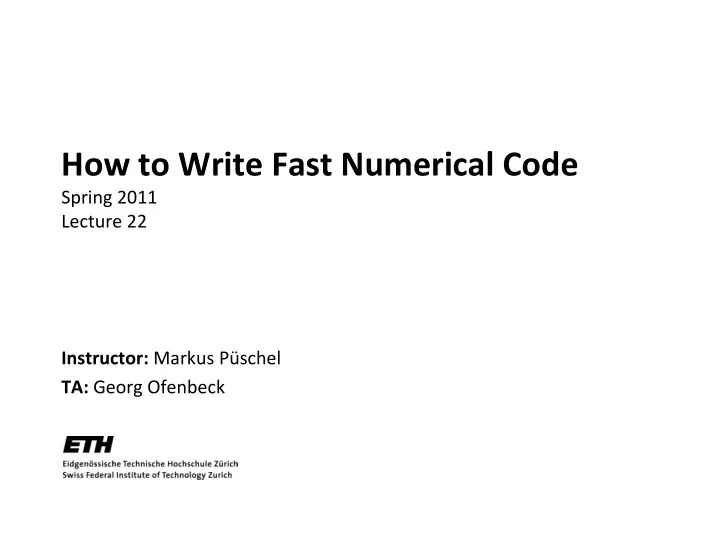

How to Write Fast Numerical Code Spring 2011 Lecture 22 Instructor: Markus Püschel TA: Georg Ofenbeck
Schedule Today Lecture Project presentations • 10 minutes each • random order • random speaker 10 Final code and paper due
Example FFT, n = 16 (Recursive, Radix 4)
Fast Implementation (≈ FFTW 2.x) Choice of algorithm Locality optimization Constants Fast basic blocks Adaptivity
1: Choice of Algorithm Choose recursive, not iterative I m ) T km DFT m ) L km DFT km = ( DFT k - m (I k - k Radix 2, recursive Radix 2, iterative
2: Locality Improvement: Fuse Stages
I m ) T km DFT m ) L km DFT km = ( DFT k - m (I k - k // code sketch void DFT( int n, cpx *y, cpx *x) { int k = choose_dft_radix(n); // ensure k <= 32 if (use_base_case(n)) DFTbc(n, y, x); // use base case else { for ( int i=0; i < k; ++i) DFTrec(m, y + m*i, x + i, k, 1); // implemented as DFT(…) is for ( int j=0; j < m; ++j) DFTscaled(k, y + j, t[j], m); // always a base case } }
3: Constants FFT incurs multiplications by roots of unity In real arithmetic: Multiplications by sines and cosines, e.g., y[i] = sin(i·pi/128)*x[i]; Very expensive! Solution: Precompute once and use many times d = DFT_init(1024); // init function computes constant table d(y, x); // use many times
4: Optimized Basic Blocks // code sketch void DFT( int n, cpx *y, cpx *x) { int k = choose_dft_radix(n); // ensure k <= 32 if (use_base_case(n)) DFTbc(n, y, x); // use base case else { for ( int i=0; i < k; ++i) DFTrec(m, y + m*i, x + i, k, 1); // implemented as DFT(…) is for ( int j=0; j < m; ++j) DFTscaled(k, y + j, t[j], m); // always a base case } } Empirical study: Base cases for sizes n ≤ 32 useful (scalar code) Needs 62 base case or “ codelets ” (why?) DFTrec, sizes 2 – 32 DFTscaled, sizes 2 – 32 Solution: Codelet generator
FFTW Codelet Generator Codelet for DFT n FFT codelet n Twiddle codelet for DFT n generator DAG Simplifier Scheduler generator DAG DAG
Small Example DAG DAG: One possible unparsing:
DAG DAG Generator Simplifier Scheduler generator DAG DAG Knows FFTs: Cooley-Tukey, split-radix, Good-Thomas, Rader, represented in sum notation For given n, suitable FFTs are recursively applied to yield n (real) expression trees for outputs y 0 , …, y n-1 Trees are fused to an (unoptimized) DAG
DAG Simplifier Simplifier Scheduler generator DAG DAG Applies: Algebraic transformations Common subexpression elimination (CSE) DFT-specific optimizations Algebraic transformations Simplify mults by 0, 1, -1 Distributivity law: kx + ky = k(x + y), kx + lx = (k + l)x Canonicalization: (x-y), (y-x) to (x-y), -(x-y) CSE: standard E.g., two occurrences of 2x+y: assign new temporary variable DFT specific optimizations All numeric constants are made positive (reduces register pressure) CSE also on transposed DAG
DAG Scheduler Simplifier Scheduler generator DAG DAG Determines in which sequence the DAG is unparsed to C (topological sort of the DAG) Goal: minimizer register spills If R registers are available, then a 2-power FFT needs at least Ω (nlog(n)/R) register spills [1] Same holds for a fully associative cache FFTW’s scheduler achieves this (asymptotic) bound independent of R Blackboard [1] Hong and Kung: “ I/O Complexity: The red-blue pebbling game ”
4 independent components 4 independent components First cut
Codelet Examples Notwiddle 2 Notwiddle 3 Twiddle 3 Notwiddle 32 Code style: Single static assignment (SSA) Scoping (limited scope where variables are defined)
5: Adaptivity // code sketch void DFT( int n, cpx *y, cpx *x) { int k = choose_dft_radix(n); // ensure k <= 32 if (use_base_case(n)) DFTbc(n, y, x); // use base case else { for ( int i=0; i < k; ++i) DFTrec(m, y + m*i, x + i, k, 1); // implemented as DFT for ( int j=0; j < m; ++j) DFTscaled(k, y + j, t[j], m); // always a base case } } Choices used for platform adaptation d = DFT_init(1024); // compute constant table; search for best recursion d(y, x); // use many times Search strategy: Dynamic programming Blackboard
MMM Sparse MVM DFT Atlas Sparsity/Bebop FFTW Blocking Cache Recursive FFT, Blocking optimization fusion of steps (rarely useful) Register Blocking Scheduling of Blocking optimization (sparse format) small FFTs Optimized basic Unrolling, scalar replacement and SSA, scheduling, blocks simplifications (for FFT) Other Precomputation of — — optimizations constants Search: blocking Search: register Search: recursion Adaptivity parameters blocking size strategy
Recommend
More recommend